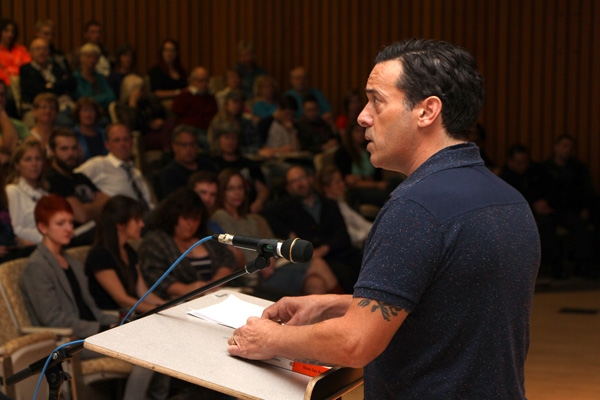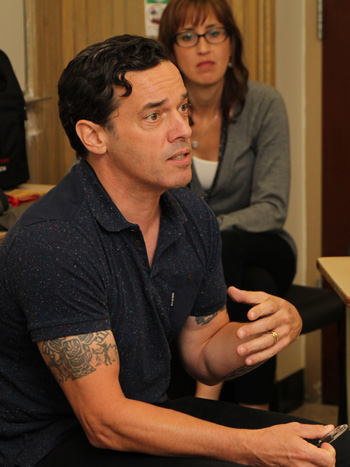News & Events
Joseph Boyden: Warrior of Words
 |
| Joseph Boyden speaking at the College of Arts & Science 2014 Book Club discussion about his novel Three Day Road on Oct. 15. |
Joseph Boyden: Warrior of Words
by dee Hobsbawn-Smith
Joseph Boyden in Saskatoon
|
“I am no warrior,” says novelist Joseph Boyden in a recent telephone conversation. “My father was a wartime physician. My brothers, uncles and nephews are soldiers. I am not.”
Boyden’s award-winning first novel, Three Day Road, which recounts the return home of a native Canadian sniper at the conclusion of the First World War, is being read by the U of S’s College of Arts & Science Book Club in recognition of the centennial of the war’s beginning. Three Day Road examines the human spirit and the requirement that we face our truths during war —or, as Boyden writes within its pages, “We all fight on two fronts, the one facing the enemy, the one facing what we do to the enemy.”
“The First World War became a mythology, the birth of a nation, when we came together,” Boyden says. “Historically, that’s what we hear, that founding, our country birthed by fire. Canadians are still very interested in that.”
Boyden wrote the first draft of Three Day Road before he could tour the battlefields of Europe. “When I got the chance to visit, what I had imagined was similar to what I found there,” he says. He didn’t pull his punches in describing battlegrounds or battles; Three Day Road is a visceral, graphic piece of writing, praised in a Quill & Quire review for “the constant crossing of the moral lines between the worldviews of native and white society.”
Boyden is at work on a new novel, the third of five books that he expects will span five hundred years in the fictional Bird family he first chronicled in Three Day Road. “I’m going back this fall to Vimy, to the Somme,” he says. “It’s a magical, powerful, frightening place.” Embodied in those battle-sites is the mythical “three day road” that the dying must walk towards their deaths.
 Despite the fact that the First World War is so often cited as a definitive moment for Canada as a nation, the Aboriginal population of Canada did not reap any benefits from participating in the war, Boyden says. “A lot of things were promised, including the vote, but that didn’t arrive ‘til 1960. They came home to be wards of the state again.”
Despite the fact that the First World War is so often cited as a definitive moment for Canada as a nation, the Aboriginal population of Canada did not reap any benefits from participating in the war, Boyden says. “A lot of things were promised, including the vote, but that didn’t arrive ‘til 1960. They came home to be wards of the state again.”
He adds that following the war, Francis Pegahmagabow—the famous Ojibwa sniper who was the inspiration for the novel’s two young native Canadian soldiers, Xavier Bird and Elijah Weesageechak—“was not even given a loan by the Indian agent to raise six horses.  He was [thought of as] too much of an animal, even though he was one of the great soldiers, that warrior spirit found again after the people had been emasculated for so long.”
He was [thought of as] too much of an animal, even though he was one of the great soldiers, that warrior spirit found again after the people had been emasculated for so long.”
Boyden, who lives in New Orleans with his wife, the writer Amanda Boyden, vehemently describes himself as a Canadian writer. New Orleans, he says, “allows me psychic and geographic distance so I can go home to my country, fill the well, come back and look more objectively.”
Passionate involvement is essential for writers, he maintains. He advises students of writing: “Don’t expect to jump into the world and become famous. It takes patience. You really need to find that original voice and material you are absolutely obsessed by.”